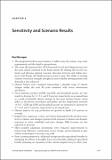Sensitivity and Scenario Results
Author(s)
Yu, Winston; Yang, Yi-Chen; Savitsky, Andre; Alford, Donald; Brown, Casey; Wescoat, James; Debowicz, Dario; Robinson, Sherman; ... Show more Show less
DownloadWescoat_Sensitivity and.pdf (1.405Mb)
PUBLISHER_CC
Publisher with Creative Commons License
Creative Commons Attribution
Terms of use
Metadata
Show full item recordAbstract
Presents the results of various scenarios using models used to study water, climate, agriculture and the economy in Pakistan's Indus Basin, and discusses the policy and investment implications. The water allocations per the 1991 Provincial Accord and within provinces remain the most critical constraint. Relaxing the Accord constraint, and allowing optimal economic allocation between and within provinces, would enhance the ability to manage extreme events by more reliably meeting system-wide demands. A plausible range of climate changes within the next 80 years could see gross domestic product (GDP), Ag-GDP, and household income decrease by 1.1, 5.1, and 2.0 percent, respectively, on an annual basis. Improvements to system-wide efficiency, construction of new storage, and investments in agriculture technologies to increase crop yield could increase production, but without specific interventions, environmental considerations, such as flow to the sea, changes in depth to groundwater, and the overall salinity situation, are projected to worsen.
Date issued
2013-04Department
Massachusetts Institute of Technology. Department of ArchitectureJournal
The Indus Basin of Pakistan: The Impacts of Climate Risks on Water and Agriculture
Publisher
The World Bank
Citation
Yu, Winston, Yi-Chen Yang, Andre Savitsky, Donald Alford, Casey Brown, James Wescoat, Dario Debowicz, and Sherman Robinson. “Sensitivity and Scenario Results.” The Impacts of Climate Risks on Water and Agriculture (April 18, 2013): 119–143. © International Bank for Reconstruction and Development/The World Bank
Version: Final published version
ISBN
978-0-8213-9874-6
978-0-8213-9875-3